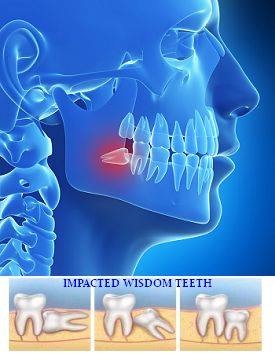THE IMPACTED WISDOM TOOTH, “DR. HOW DO I KNOW WHEN I SHOULD CONSIDER REMOVING IT?”

The ultimate question: "Why should I remove my wisdom teeth, Dr. Dargham? They don't bother me."
- Impacted wisdom teeth are not always removed. There are times extraction of these teeth should not even be considered! As you all must know, wisdom teeth are the third molars and they are not always in the most optimal position within your jaw. When a jaw is not large enough, or when your mouth does not have enough room to accommodate the wisdom teeth, these can become impacted, or lodged, somewhere between the bony socket and the overlying gummy tissue that supports them. In other words, they are not erupted into the mouth in an erect fashion as the rest of your teeth are. Sometimes they are not visible because they remain completely within the jaw bone, and at times they are partially erupted, peaking through the gum line just slightly.
What is considered an impacted wisdom tooth?
- A tooth that is growing sideways
- A tooth that is only partially erupted
- A tooth that is trapped beneath the gum line
What is normally done with an impacted wisdom tooth?
- The tooth is removed ( extracted )
- The tooth is left alone
An impacted wisdom tooth may be positioned in a manner that does not negatively affect the adjacent teeth. Some of these are not pathologic ( not associated with disease ) and are not decayed or infected. These may be left alone should their future prognosis be favorable.
At other times, the impacted wisdom tooth is disruptive to the molars positioned just in front of it. Because they share the same bed of jaw bone, infected wisdom teeth may pose the same risk to the neighboring tooth, rendering its future health risky. Another cause of concern may be your inability to properly clean these teeth, either because you do not reach them or because they are positioned in a manner that does not allow for ideal access. This, in turn, may also affect the health of the adjacent molars. Wisdom teeth are often associated with cystic developments. These cysts may be associated with infection and other pathologic concerns if not removed in time to prevent them from progressing.
The lower jaw bone houses a very important nerve trunk that delivers sensation to your teeth, gums, lips, and face. When disturbed, this nerve may become irritated or even permanently damaged, altering the normal sensation in these areas. The roots of lower impacted wisdom teeth are at times positioned very closely to this nerve trunk. When so, we normally advise against extraction of the involved wisdom tooth. In these cases, the risks of extraction may outweigh the benefit of doing so. Proper clinical evaluation and radiographic imaging assesses the position of these wisdom teeth in relation to the nerve trunk, enabling a thoughtful and mindful treatment plan.
The extraction of impacted wisdom teeth should be considered as early as the first sign of disease or discomfort. Thorough evaluation by your dentist allows for proper timing of the treatment. Ideally positioned teeth should be easily accessible for optimal homecare and therapy. If not, the extraction of these is warranted. Each patient and scenario is different and requires customized evaluation and care. I would advise a thorough examination and discussion to determine if the extraction of impacted wisdom teeth is warranted for you. It is not the same answer for everyone.
Feel free to contact my office should you like to consult about this, or any other, oral health matter. Remember, we are here to assist you in creating, and maintaining, that "Smile You'd Be Proud To Wear....ANYWHERE!!"


